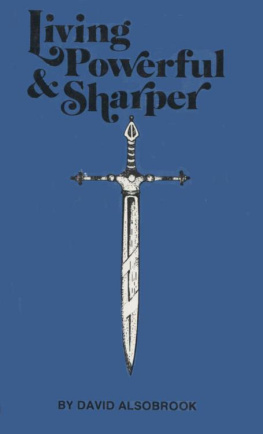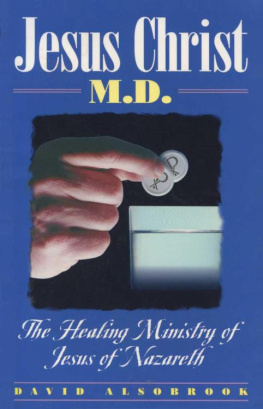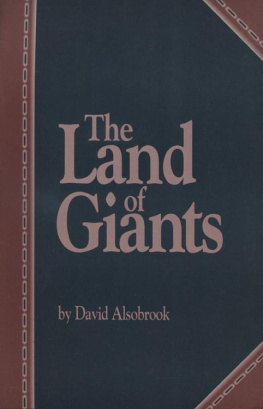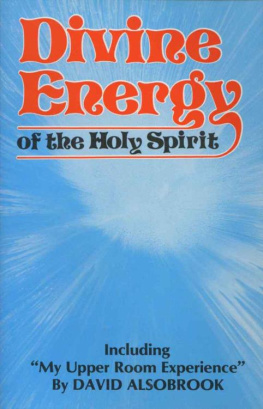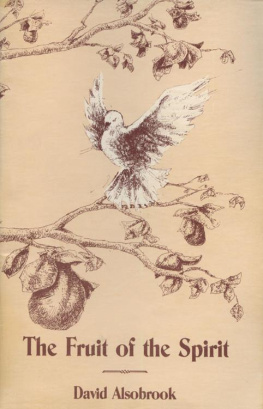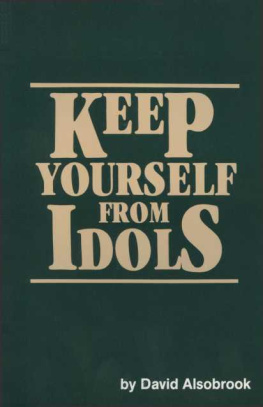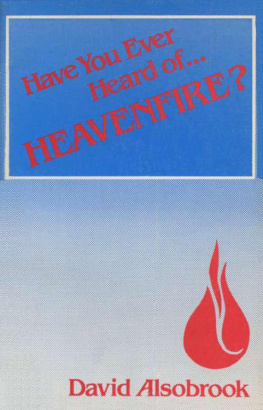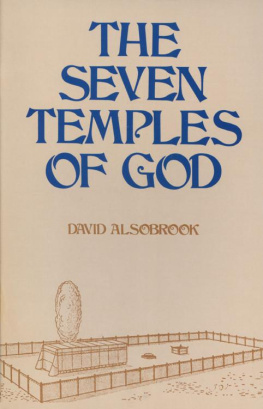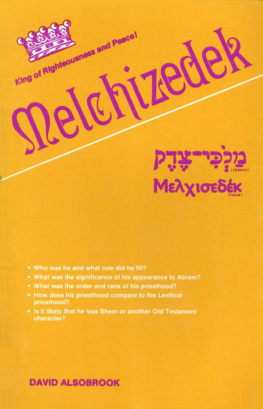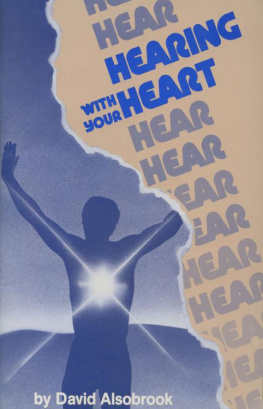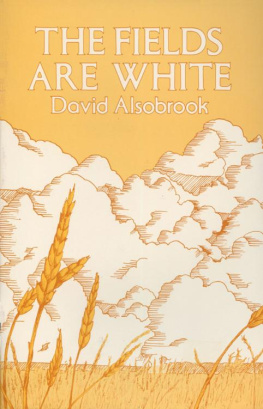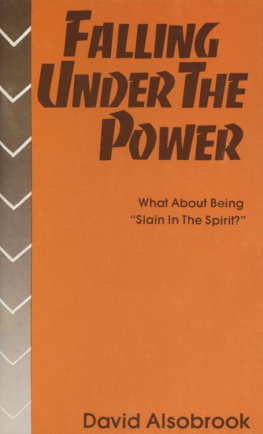David Alsobrook - Living powerful & sharper
Here you can read online David Alsobrook - Living powerful & sharper full text of the book (entire story) in english for free. Download pdf and epub, get meaning, cover and reviews about this ebook. City: Paducah, Ky, year: 1985, publisher: D. Alsobrook Evangelistic Association, genre: Religion. Description of the work, (preface) as well as reviews are available. Best literature library LitArk.com created for fans of good reading and offers a wide selection of genres:
Romance novel
Science fiction
Adventure
Detective
Science
History
Home and family
Prose
Art
Politics
Computer
Non-fiction
Religion
Business
Children
Humor
Choose a favorite category and find really read worthwhile books. Enjoy immersion in the world of imagination, feel the emotions of the characters or learn something new for yourself, make an fascinating discovery.
- Book:Living powerful & sharper
- Author:
- Publisher:D. Alsobrook Evangelistic Association
- Genre:
- Year:1985
- City:Paducah, Ky
- Rating:3 / 5
- Favourites:Add to favourites
- Your mark:
- 60
- 1
- 2
- 3
- 4
- 5
Living powerful & sharper: summary, description and annotation
We offer to read an annotation, description, summary or preface (depends on what the author of the book "Living powerful & sharper" wrote himself). If you haven't found the necessary information about the book — write in the comments, we will try to find it.
Living powerful & sharper — read online for free the complete book (whole text) full work
Below is the text of the book, divided by pages. System saving the place of the last page read, allows you to conveniently read the book "Living powerful & sharper" online for free, without having to search again every time where you left off. Put a bookmark, and you can go to the page where you finished reading at any time.
Font size:
Interval:
Bookmark:
Living, Powerful, And Sharper
"For the Word of God is quick, and powerful, and sharper than any two-edged sword, piercing even to the dividing asunder of soul and spirit, and of the joints and marrow, and is a discerner of the thoughts and intents of the heart. Neither is there any creature that is not manifest in His sight; but all things are naked and opened unto the eyes of Him with Whom we have to do" (Hebrews 4:12-13).
Before we begin our exposition of the gem of scripture dealing with the characteristics and operations of God's Word, let us notice briefly the previous 24 verses (3:7-4:11). This admonition is the second and by far, the longest, of five major warnings in the Epistle to the Hebrews. "The Warning Against Unbelief," as it is usually termed, uncovers the evilness of an unbelieving heart and why one departs from the Living God in such a state. Refusing to be persuaded of God's ability is the root of the problem, we learn, and will cause a child of God to forfeit the inheritance God promises in Christ.
The writer, following his usual custom in this letter, uses a tragic incident in ancient Israel for a precedent and example which his Hebrew readers will do well not to follow. Their forefathers had an evil heart of unbelief which caused them to depart from the Living God. In refusing to believe God could bring them into the Land of Canaan, they provide the Christian era a vivid lesson of the dangerous results of unbelief: Failure To Receive The Promised Inheritance.
The entire wilderness generation, with the exception of two hardy souls, died in unbelief as they wandered a year for each day the twelve spies had searched the land.
Except for Joshua and Caleb, all the adult population failed to enter God's rest. Their children, who they thought would be a hindrance to them, grew up to take the land that flowed with milk and honey. The initial recipients of this letter were Hebrew, both in ethnic origin and religious heritage. The writer warns them that they, too, would fail to enter the rest provided in the Messiah for the same reason their ancient predecessors failed to enter into the flowing land. He concludes his warning with this admonition: "Let us labor, therefore, to enter into that rest lest any man fall after the same example of unbelief (4:11).
Immediately he continues, "For the Word of God..."
The word "for" means "because" and is explanatory of the preceding statement. Essentially he says: "Let's labor to enter into our inheritance because the Word of God is able to bring us into it!"
Exactly he says "For the Word of God is quick, and powerful, and sharper than any twoedged sword..." By this he tells us that the promise God had given the ancient people was more powerful than any two-edged sword wielded by the giants of Anak. True, he says, the wilderness generation did not have standard war weapons and the Canaanites did have them. In addition, their foes were giant-like and they were but grasshoppers by comparison (see Numbers 13:32-33). Notwithstanding, had they only believed the Word of God they would have found it more quick, powerful, and sharper than any of the swords in the land of their inheritance. They could have gone right into the land God gave Father Abraham and possessed their inheritance. They would have known rest from continual wanderings in the desert. But, the sad truth is, Israel did not believe God's Word was stronger than their foes and they perished in their unbelief. The writer to the Hebrews is telling them that just as Israel fell short of God's ideal for them, the Jewish believers reading his letter may likewise come short of God's rest in Christ.
What the author does in 4:12-13 is to define three characteristics and three operations of the Word of God.
Here the Scripture describes God's Word in two short verses. The Bible comments on itself and describes its three chief characteristics as: Quick, Powerful, and Sharper. The three distinct operations of the Word of God are piercing, dividing, and judging. Before we examine these three characteristics and operations, however, let's study the subject itself:
Understanding The Logos
In the original the "Word" is logos. The Epistle to the Hebrews and the Gospel of John use logos more than any other two books in the New Testament. John uses the term in reference to the Person of Jesus Christ, the Word made flesh, whereas the writer to the Hebrews uses the term in its alternate meaning: "the sum total of all God has spoken." The full meaning of the Logos is both the living embodied Word in a Person, and the sum total of all God has said in a Book. John reveals the Word in Jesus; Hebrews uses the Logos as the revelation of recorded truth. Hebrews refers to Jesus in His role as
"Son" rather than the Word. "Seeing then that we have a great high priest that is passed into the heavens, Jesus the Son of God..." (verse 14). In chapter two he used the sonship of Jesus at least five times.
Isn't it interesting, and clearly the Holy Spirit's work, that each of these books (John and Hebrews) use the term
"logos" often throughout their letters? Obviously it was given to us this way to reveal both sides of the same coin.
The Logos of God, the sum total of revealed truth, is quick, powerful and extremely sharp. Let us look at these three descriptive adjectives.
Living
The word "quick" is literally zon and means "living, alive, full of life." The word is used to denote a higher realm of life than the natural plane. The King James Version uses the obsolete word "quick" in a number of places to denote the living. The newer translation is, of course, "living," but God's Word is "quick," too! The psalmist said, "His Word runneth very swiftly" (Psalm 147:15). It is quick, speedy and fast! Why? BECAUSE IT IS ALIVE!!
The Word God speaks is alive, which I why I disagree with the commonly heard evangelical statement:
"Jesus is the Living Word; the Bible is the written Word."
I said that a few times, also, until I read Hebrews 4:12
with my eyes anointed with eyesalve! The writer clearly tells his readers that the Word of God, concerning which he means the sum total of the inspired writings, is living.
Jesus is surely the Living Word personified. The Scriptures, which reveal Him throughout, are alive, too!
People who refer to the Bible as boring are only describing themselves. When you hear it said the Bible is dead you are hearing people describe their own sad condition, not the Word of God!
In the Bible we find several references in which God's Word is compared to a seed. Is it not correct that seed which is sown into the ground has the life principle within it? "The seed is the Word of God" (Luke 8:12).
The life of God is in His Word. This explains why His Word quickens us when it gets inside our hearts. "I will never forget Thy precepts: For with them Thou hast quickened me" (Psalm 119:93). Jesus promised us that our prayers will be answered when His Word lives inside us. "If ye abide (live) in Me, and My Words abide (live) in you, ye shall ask what ye will, and it shall be done unto you" (John 15:7).
Some reply with 2 Corinthians 3:6 in refutation:
"...the letter killeth, but the Spirit giveth life." The context shows Paul is referring to the letter of the Law and not to the new covenant. The principle is true even out of context: the black and white printed characters upon a page are not the Word, per se, as they would not not be living or powerful if the same words were rearranged. I speak of the Word that came forth out of God's mouth as that which cannot return to Him void. This is what we have recorded for us and revealed to our hearts by the same Holy Spirit who moved upon the ancient prophets to speak it. "It is the Spirit that quickeneth; the flesh profiteth nothing: the Words that I speak unto you, they are spirit, and they are life" (John 6:63). The divine thought communicated by the Spirit of God contained in 66 books is sharper than any two-edged sword. It is powerful enough to judge the world in the last day.
Next pageFont size:
Interval:
Bookmark:
Similar books «Living powerful & sharper»
Look at similar books to Living powerful & sharper. We have selected literature similar in name and meaning in the hope of providing readers with more options to find new, interesting, not yet read works.
Discussion, reviews of the book Living powerful & sharper and just readers' own opinions. Leave your comments, write what you think about the work, its meaning or the main characters. Specify what exactly you liked and what you didn't like, and why you think so.

